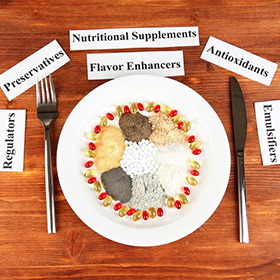
Previously I have written on the emulsifiers so I hope you have made some changes. The sulfites and other preservatives are considered food additives intended to limit bacterial contamination and are generally regarded as safe. However, as expected, bactericidal chemicals have been shown to damage beneficial bacteria in the human gut. Sodium bisulfite and sodium sulfite have been shown to have negative effects on our beneficial gut microbiota including Lactobacillus species after two hours of exposure at concentrations of sulfites between 250–500 ppm, concentrations typically found in foods.
Sulfites are added to beer, wine, juices, dried fruit, processed fish, seafood, meats, and some canned goods and are intended primarily for controlling microbial growth, preventing browning and food spoilage. The sulfite concentration in red and white wine is around 70 mg/L and 122 mg/L respectively. This means that drinking about two glasses of wine (450 mL) a day equates to an intake of 75% to 130% of ADI for a 60-kg person. A glass or two of wine may have a benefit on the gut microbiome but the preservative in it doesn’t. Combined with typical additional intake of sulfites common in a Western diet, the average total dietary exposure to sulfites could come to a total of 294% of ADI for adults, well over the amount generally regarded as safe and a level likely to do harm to the gut microbiota.
[1] Irwin et al., 2017.
[2] Leclercq et al., 2009.